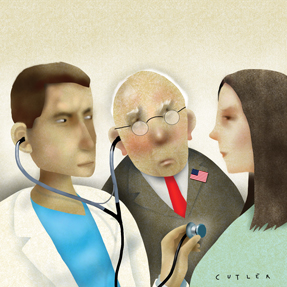Letters to the Editor
Readers respond: EMRs and physician incomes.
Debating EMRs
In her recent column (“Electronic medical records have yet to fulfill their potential,” ACP Internist, October 2011), ACP president Virginia L. Hood, MBBS, MPH, FACP, blames electronic medical records (EMRs) themselves for her difficulties in adopting this new technology. However, I believe she is identifying human, not EMR, problems.

Dr. Hood reports that long training sessions did not address her needs. That is a training issue, not an EMR issue. Where was her at-the-elbow support during those long months of self-training? She writes that it took more than three weeks to get used to the system, an indicator that something was dreadfully wrong with training and post go-live support.
Dr. Hood is correct that any system produces the results for which it was designed, but she is wrong when she claims that templates, document length, and note format are preordained by auditing, compliance and billing personnel. I have seen notes that are telegraphic, others that are lists of findings, and others that separate positive from negative findings with as few as three key strokes, and each note is unique. Physicians must be involved in the design phase early on to avoid the issues she mentions. Her description of her problems makes it clear that this did not occur in her institution.
All EMRs certified for meaningful use can import laboratory values, group similar results together, and produce comprehensive electronic records for export to other physicians with disparate EMRs. If Dr. Hood's system lacks those abilities, her institution may not have performed due diligence to ensure that her EMR qualifies for meaningful use. If she is using a certified product, there may be reasons why these functions are currently not active, such as lack of personnel to configure them, lack of a health information exchange, or lack of planning and local design, but those are human shortcomings, not software failures.
Regarding gag clauses, they are not, in my experience, “typical” in vendor contracts, and any good health care attorney should remove them. As a chief medical informatics officer, I participate in collegial listserv discussions regarding defects and other apparent faults in our EMR, and believe me, we are not shy about discussing our concerns openly.
We do need more programmers to help optimize our electronic tools. There is a critical shortage of this skill. But personalizing our EMRs to reflect our individual, group, or specialty needs also takes physician leadership, involvement and commitment. Unfortunately, most physicians I know take a passive approach, and it will cost them just as it cost Dr. Hood. We eagerly pursue continuing medical education and take courses to perfect new procedural skills. Why don't we do the same with EMRs?
My conclusion after reading Dr. Hood's column is not that EMRs have yet to fulfill their potential, but that Dr. Hood and her institution needed to prepare, design, educate and train better before implementation. I feel bad for her, but we must recognize when the problem is of our own creation.
Richard Schreiber, MD, FACP
Camp Hill, Pa.
In response: I welcome Dr. Schreiber's enthusiastic support for EMRs and wholeheartedly endorse their use as an important component of optimal patient care. It is true that all EMRs are not the same, each having good and less good features as well as individual learning challenges for users. I also appreciate that Dr. Schreiber reiterated my advocating for physicians to be involved early in EMR design and implementation to ensure better functionality. I absolutely agree that many of the limitations that have not allowed EMRs to fulfill their potential are the result of inadequate human input, including those factors he lists. However, I do not agree that I or other physicians should need extensive courses to prepare us to use a tool that should be user-friendly enough to equip us with all the information necessary to provide better patient care and allow optimal use of our time and unique expertise as physicians.
Virginia L. Hood, MBBS, MPH, FACP
Burlington, Vt.
Physician income and the deficit
In his Washington Perspective column in the November/December 2011 ACP Internist (“What should physicians contribute to deficit reduction?”), Robert B. Doherty treads delicately on a critical issue of the day, delicately indeed since ACP is a membership organization and some members are at risk of losing reimbursement from the Centers for Medicare and Medicaid Services as the price for a sustainable growth rate (SGR) fix.
Mr. Doherty does not ask whether physicians should contribute because it's clear we will, like it or not. He indirectly asks us to listen to our better angels about professional duty to help a nation in crisis, a nation that has given us much. He points out that we will likely all lose income, some more than others, and that cutting chronically underpopulated and relatively underpaid specialties may truly hurt long-term access. On that, CMS needs to be very careful.
However, Mr. Doherty omits that physician income growth has long and far exceeded U.S. cost of living and wages and that mean physician income has long exceeded the median, causing one medical student I know to reflect, “Some of our brothers and sisters are doing very well.” Physician incomes are part of the growing gap between rich and poor Americans. Physician whining about income and threats to general access have outlived reality; the facts won't support the arguments and policymakers know it. The numbers support a view that U.S. physician income growth and wasteful use of resources are limiting our ability to provide care to all Americans. If that's not a professionalism issue, what is?
Norman Jensen, MD, MS, FACP
Madison, Wis.




